Continuous Variable
Valve Timing (CVVT) system advances or retards the valve timing of the
intake and exhaust valve in accordance with the ECM control signal which
is calculated by the engine speed and load.
By controlling CVVT, the
valve over-lap or under-lap occurs, which makes better fuel economy and
reduces exhaust gases (NOx, HC) and improves engine performance through
reduction of pumping loss, internal EGR effect, improvement of combustion
stability, improvement of volumetric efficiency, and increase of expansion
work.
This system consist
of
| - |
the CVVT Oil Control Valve (OCV) which
supplies the engine oil to the cam phaser or runs out the engine oil
from the cam phaser in accordance with the ECM PWM (Pulse With
Modulation) control signal, |
| - |
the CVVT Oil Temperature Sensor (OTS) which
measures the engine oil
temperature, |
| - |
and the Cam Phaser which varies the cam phase
by using the hydraulic force of the engine
oil. |
The engine oil getting
out of the CVVT oil control valve varies the cam phase in the direction
(Intake Advance/Exhaust Retard) or opposite direction (Intake
Retard/Exhaust Advance) of the engine rotation by rotating the rotor
connected with the camshaft inside the cam phaser.
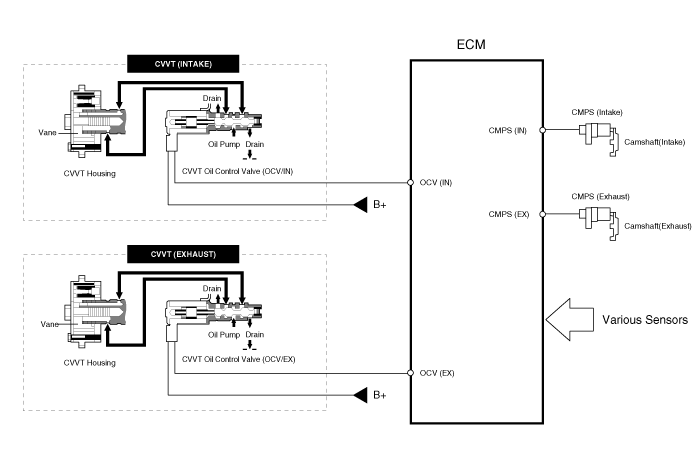
The CVVT has the
mechanism rotating the rotor vane with hydraulic force generated by the
engine oil supplied to the advance or retard chamber in accordance with
the CVVT oil control valve control.
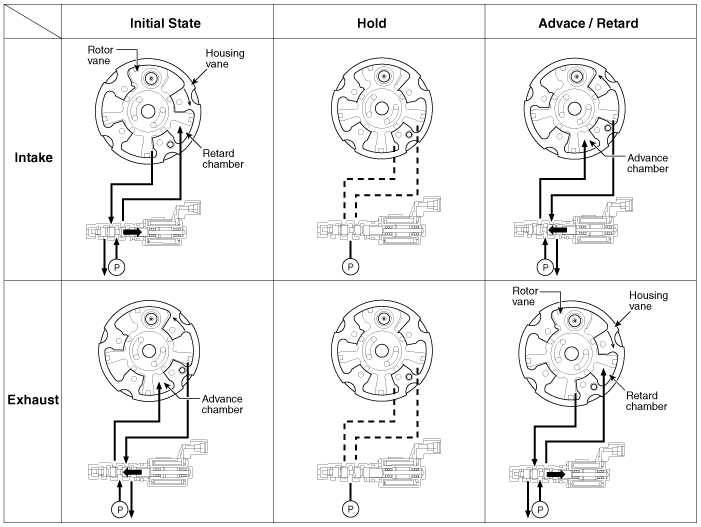
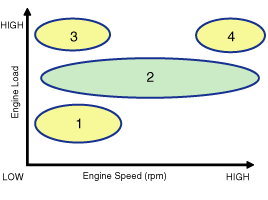
(1) Low Speed /
Low Load
|
(2) Part
Load
|
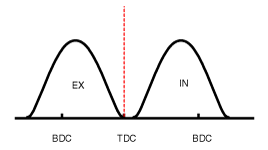
|
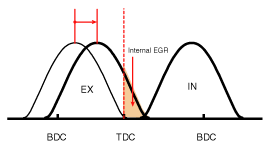
|
(3) Low Speed /
High Load
|
(4) High Speed /
High Load
|
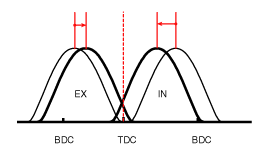
|
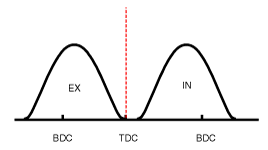
|
Driving
Condition
|
Exhaust Valve
|
Intake Valve
|
Valve
Timing
|
Effect
|
Valve
Timing
|
Effect
|
(1) Low
Speed
/Low Load
|
Completely
Advance
|
* Valve
Under-lap
* Improvement of combustion
stability
|
Completely
Retard
|
* Valve
Under-lap
* Improvement of combustion
stability
|
(2) Part
Load
|
Retard
|
* Increase of
expansion work
* Reduction of pumping
loss
* Reduction of HC
|
Retard
|
* Reduction
of pumping loss
|
(3) Low
Speed
/High Load
|
Retard
|
* Increase
of expansion work
|
Advance
|
*
Prevention of intake back flow (Improvement of volumetric
efficiency)
|
(4) High
Speed
/High Load
|
Advance
|
* Reduction
of pumping loss
|
Retard
|
*
Improvement of volumetric
efficiency
|